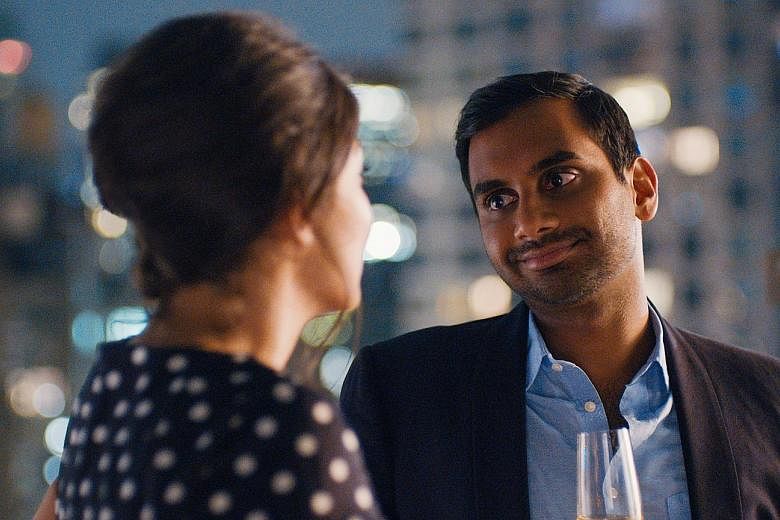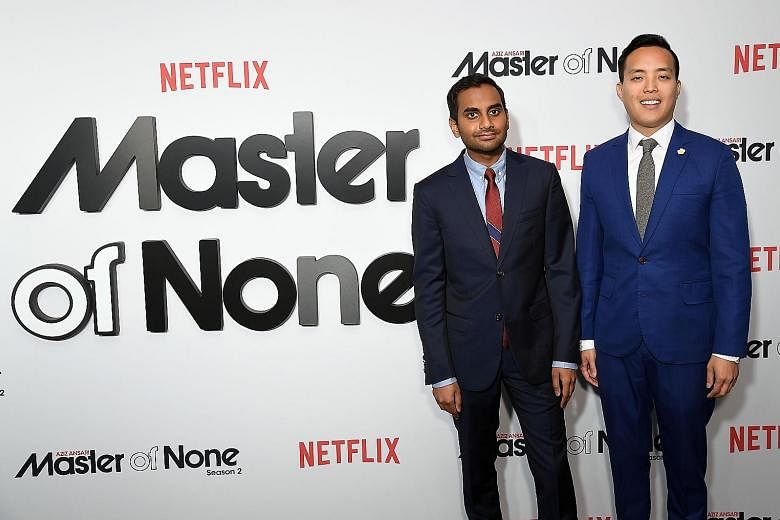Aziz Ansari and Alan Yang did not think they were doing anything special when they cast Ansari as the romantic lead in Master Of None, their acclaimed Netflix comedy series.
So they were stunned at the reaction from critics and fans, who noted how unusual it was to see Asians depicted this way in Hollywood.
Ansari, who plays protagonist Dev, a character loosely based on himself, says: "We were kind of taken aback by the stuff we were reading. It was, 'Wow, it's crazy that this stars a guy like Aziz and he's the romantic lead.'"
The pair insist, however, that they were not trying to make a political point, but merely writing about their own lives, which happen to include Indian and Chinese immigrant parents, an ethnically diverse group of friends and romance.
With the latter, "we weren't trying to make any statement", says Ansari, 34, whose parents Shoukath and Fatima Ansari play Dev's father and mother.
"You know, I do interact with women," says the star, who is a successful stand-up comic. "I'm not like the Indian characters in most television and film."
Confirming this is Yang, his 33-year-old co-creator and the inspiration for Dev's Taiwanese- American friend Brian, played by Kelvin Yu.
"Sometimes we get the question: 'Are these political choices you're making?' And the answer is, honestly, we're just trying to write (about) what our lives look like," says the Harvard-educated comedy writer, who met Ansari when they were working on the sitcom Parks And Recreation (2009 to 2015).
The pair were speaking in Los Angeles last week, at a screening of episodes from their second season, released on Netflix last month.
Master Of None was a critical smash hit when it debuted in 2015, winning Yang and Ansari the Emmy for Outstanding Writing For A Comedy Series last year. Season 2 has been just as well-received, prompting a fervent Netflix campaign for it to be nominated again for this year's Emmys in September.
Even as its creators deny having a political agenda for their show - which often tackles weighty subjects such as racism, sexism, homophobia and religion, albeit with a light touch - they know its reflection of diversity is an asset, if for no other reason than novelty.
Ansari says: "Throughout American film and TV, there's been an insane dominance of stories from the perspective of straight white guys.
"And there are just so many other stories. For us, it's a blessing because we can say and do all this stuff and no one's done it. That makes it easier for us."
For instance, this season looks back at Dev's annual Thanksgiving dinners with the family of his friend Denise - which is basically "one Indian guy and three black women the whole episode", he jokes.
Yang points out that episodes such as this are also a reflection of the others who work on the show, including African-American actress Lena Waithe, the 33-year-old who plays Denise, and 36-year-old director Melina Matsoukas, who is of Greek, Jewish, Cuban and Jamaican heritage. "These are the people creating the show and that's just what we look like. That's reality for us," he says.
Taking a dig at the all-white writers' rooms so prevalent in the industry, Ansari impishly says: "If you had an all-white creative team doing this stuff, I'd be, like, 'What's going on? All right, man, enough.'"
Having authentic voices tell these stories is why Yang and Ansari asked Waithe to co-write the Thanksgiving episode, which is based on the actress' own experience of coming out to her family as gay.
"One thing we learnt from the first season is no one can tell your story better than yourself," Ansari says.
Yang says the show is, on some level, trying to undermine stereotypes, which he believes people of every colour try to do in their lives.
"I think I try to subvert expectations because a lot of Asian people are supposed to be quiet and kind of boring - and so I want to be loud and funny, that's what I'm trying to do," he says.
"It took me a long time to realise what was going on. It's like: I want be different, I want to be special."
The series does best when it is able to tap into raw insights such as these, Ansari believes.
"The show works well when we're telling a really honest story. The things that people have come up to us about are all things that really happened, whether it's the stuff about our parents or the stuff in the Thanksgiving episode.
"When you're coming from a real place of honesty, there's humour in it, there's drama, there's everything. And that's when I find the show to be successful."
•Both seasons of Master Of None are available on Netflix.


